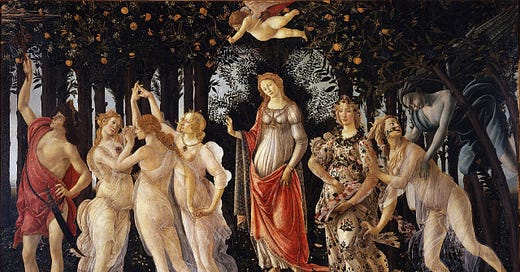The death of God gives rise to the rebirth of the gods. We are polytheists.
Polytheism is the name given to a specific religious situation. The situation is characterized by plurality, a plurality that manifests itself in many forms. Socially, polytheism is a situation in which there are various values, patterns of social organization, and principles by which man governs his political life. These values, patterns, and principles sometimes mesh harmoniously, but more often they war with one another to be elevated as the single center of normal social order. Such a situation would be sheer anarchy and chaos were it not possible to identify the many orders as each containing a coherence of its own. Socially understood, polytheism is eternally in unresolvable conflict with social monotheism, which in its worst form is fascism and in its less destructive forms is imperialism, capitalism, feudalism and monarchy. There is an incipient polytheism always lurking in democracy. This polytheism will surface during the history of democracies if the civilization does not first succumb to anarchy. In calling our time polytheist, we are saying something about the state of democracy in our time.
Polytheism is not only a social reality; it is also a philosophical condition. It is that reality experienced by men and women when Truth with a capital “T” cannot be articulated reflectively according to a single grammar, a single logic, or a single symbol-system. It is a situation that exists when metaphors, stories, anecdotes, aphorisms, puns, dramas, and movies, with all their mysterious ambiguity, seem more compelling than the rhetoric of political, religious, and philosophical systems. They seem more compelling than tightly argued and logically coherent explanations of self and society because they allow for multiple meanings to exist simultaneously, as if Truth, Goodness, and Beauty can never be contained in a logic that allows for only one of the following: good versus evil, light versus dark, truth versus fiction, reality versus illusion, being versus becoming. In a philosophically polytheistic situation the “new science” of the time will break forth with principles of relativism, indeterminacy, plural logic systems, irrational numbers; substances that do not have substance, such as quarks; double explanations for light; and black holes in the middle of actual realities.
Psychologically, polytheism is a matter of the radical experience of equally real, but mutually exclusive aspects of the self. Personal identity cannot seem to be fixed. Normalcy cannot be defined. The person experiences himself as many selves each of which is felt to have autonomous power, a life of its own, coming and going on its own and without regard to the centered will of a single ego. Yet surprisingly this experience is not sensed as a pathology. One gets along quite well in reality; in fact, the very disparateness of the multifaceted self seems to have survival power. It seems to carry with it a certain advantage in the face of the times. If the academic psychology by which the self explains the self to itself is monotheistic and cannot provide sufficient rationale for understanding in such a time, then the psychology will itself have to be reformed polytheistically.
From David L. Miller’s The New Polytheism, Spring Publications
“Following in the archetypal psychology tradition of James Hillman, this work by David L. Miller argues that the traditional psychotherapeutic goal of an integrated whole is monotheistic. He argues instead for a polytheistic theology that is psychological, iconoclastic, and gnostic and views the mythos of gods and goddesses imaginally, as a theologica imaginalis, a perspective for which Gaston Bachelard and Henry Corbin laid the philosophical foundation.”





